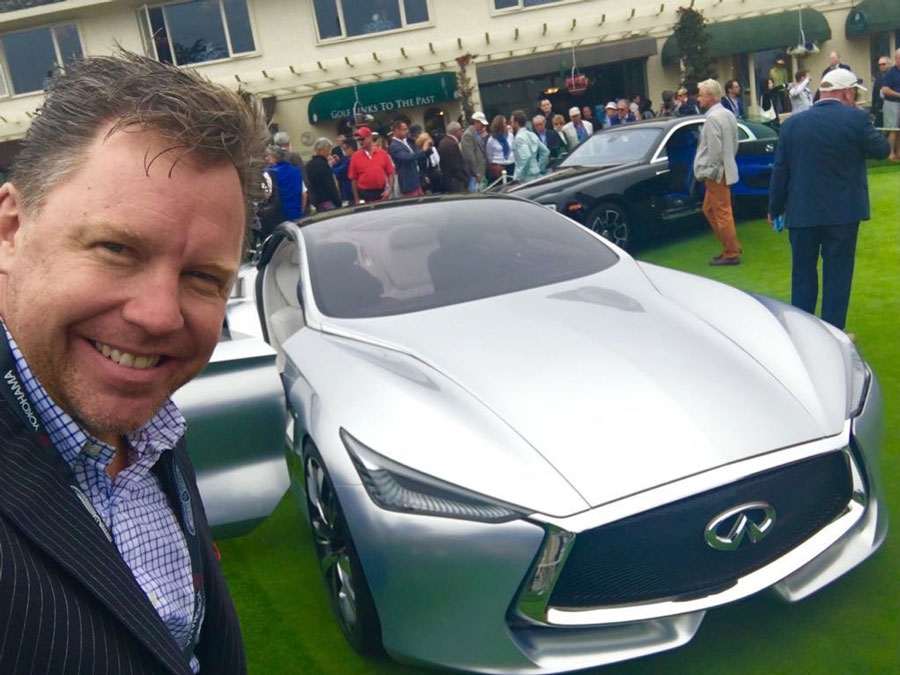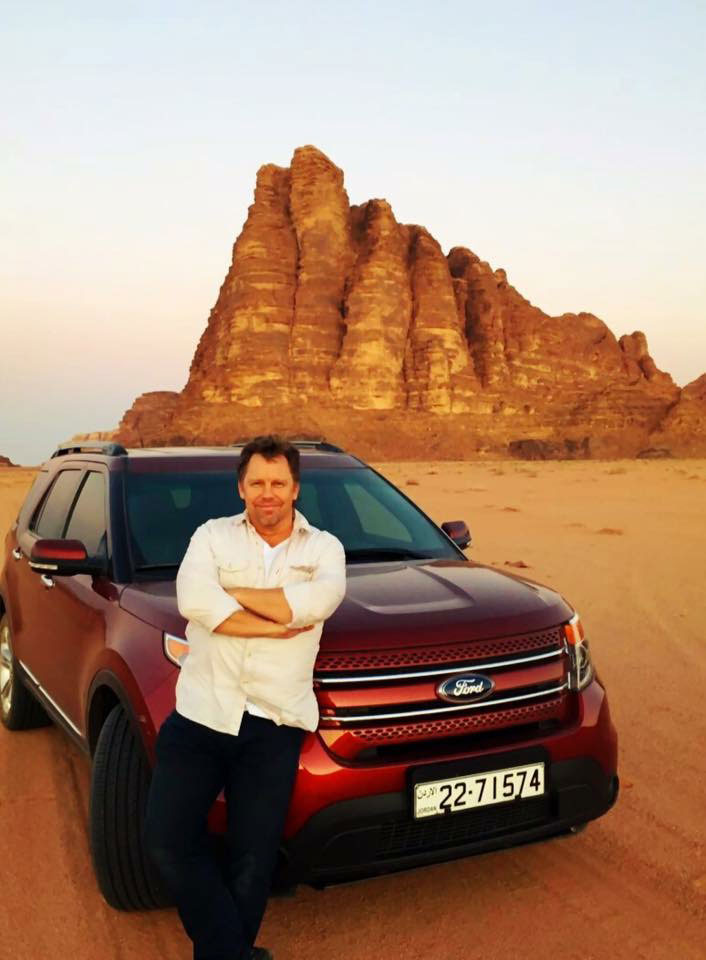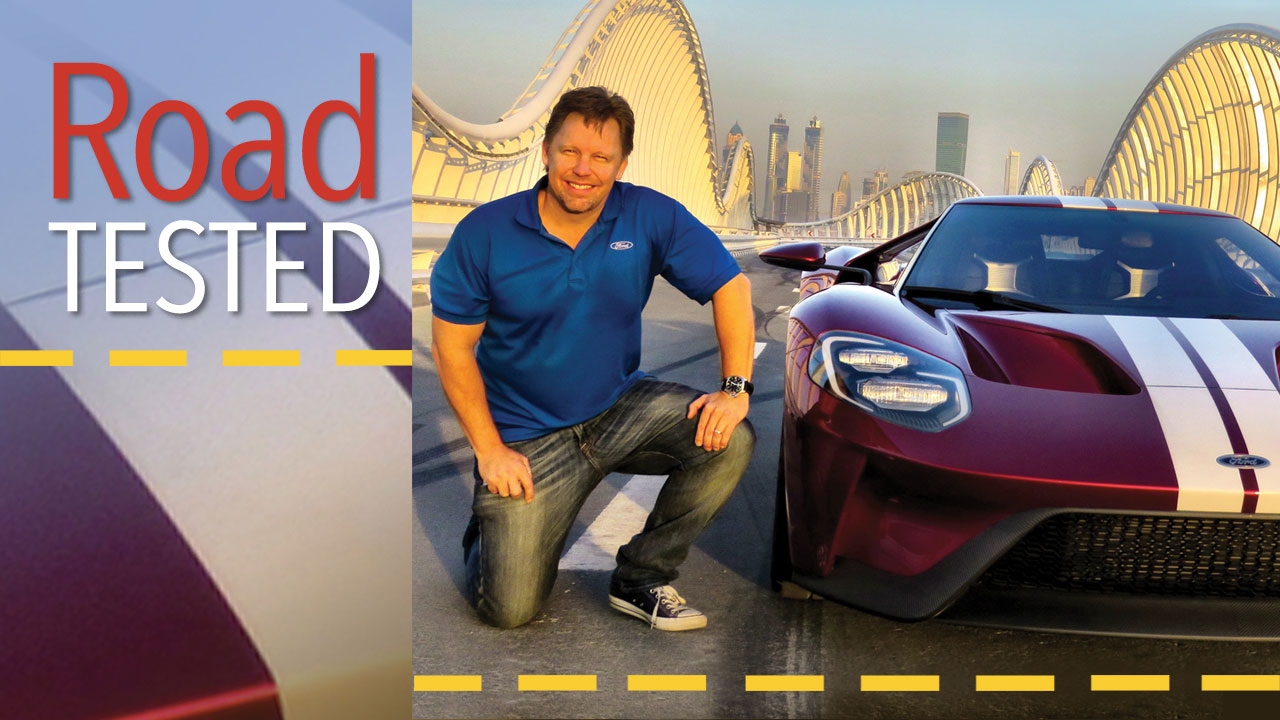Hale (above) greets a Ford GT under Dubai’s shining skyline.
Cars are a universal language. In English or Afrikaans, Mandarin, Cantonese, Arabic, or Swahili, cars give a four-wheeled, fuel-injected voice to our lives and dreams.
And few people are as fluent as UAB alumnus Trevor Hale. To say that he lives and breathes cars would be an understatement. In September 2016, he was named head of global communications for Infiniti, the Japanese luxury automaker owned by Nissan—the latest stop in a globetrotting career working with some of the world's top automakers. In each company, he has taken on a daunting task: to share stories reflecting the brand's legacy that will remain fresh and relevant across a spectrum of cultures.
From Cullman to China
“There’s nothing quite like the car business,” says Hale. After graduating from UAB in 1992 with a bachelor’s degree in communication studies, the Cullman native’s public relations career shifted into high gear with a position at Mercedes-Benz’s new Alabama plant. As his passion and expertise grew, Hale’s road led to senior communication roles in exciting cities around the world—from New York to Beijing with DaimlerChrysler, and Shanghai to Dubai with Ford.
With each move, Hale has jumped feet first into learning new languages and cultures, especially concerning business practices and consumer behavior. He describes China as being “the deep end of the pool” culturally. He loved it and thrived there, both personally and professionally. “Making that transition is all about attitude,” he says. “If you appreciate the fact that things aren’t the same as you are used to, then that’s half the battle. And having a sense of curiosity is key.”
 Hale shows off the Infiniti Q80 concept car at the 2016 Pebble Beach Concours d'Elegance.
Hale shows off the Infiniti Q80 concept car at the 2016 Pebble Beach Concours d'Elegance.
Differences in Demand
That unquenchable sense of curiosity now brings Hale to Infiniti and his new home in Hong Kong. He arrives at a crucial time, when the automaker is launching new models and offering peeks at a sleek concept car, the Q80. Hale will play a key role in helping Infiniti promote these models, build its brand, and expand into new markets.
He brings plenty of experience in that arena. In his previous job, as Ford's director of communications in the Middle East and Africa (MEA), he led a multinational, multilingual Dubai-based team crafting strategies to engage potential customers in a region many consider to be the world’s final frontier for automotive growth.
Ford's MEA territory spans 67 countries, and figuring out what motivates and excites consumers from South Africa to Saudi Arabia and Israel to Angola was the core of his team’s challenge.
“We are still learning so much about the MEA markets,” Hale says, describing each of the territory’s subregions as vastly different in taste and style. “Middle Eastern tastes are closer to American, with petrol engines, trucks, SUVs, and bigger cars,” he comments. “And Dubai is the super-car capital of the world. You can't throw a fried kibbeh without hitting a Ferrari in that town.”
 Hale traveled throughout the Middle East and Africa to produce advertising campaigns and promote Ford cars at auto shows. Here, he visits Jordan's landmark Seven Pillars.
Hale traveled throughout the Middle East and Africa to produce advertising campaigns and promote Ford cars at auto shows. Here, he visits Jordan's landmark Seven Pillars.In contrast, north Africa prefers diesel vehicles, while many families in sub-Saharan Africa are transitioning from two to four wheels, making small, affordable cars most desirable. And South Africa is a totally different ballgame, where consumers drive on the right side of the car and want a range of choices, from petrol to diesel engines and pickups (known as “bakkies”) to small vehicles.
“Throughout MEA, and throughout the world, cars are seen as extensions of ourselves,” Hale notes.
Crafting Compelling Messages
“The business taps into visceral and emotional feelings people have about cars," Hale adds. For example, he designed campaigns for Morocco and Algeria using video from the Ford GT's classic 1966 win at Le Mans to generate excitement and convey a reputation for excellence.
But Hale also believes that the most effective messages connect to what is important in consumers’ lives. When an extraordinary event occurred in Dubai—it rained—Hale’s team seized the opportunity to develop a series of tips for driving in a downpour. “It’s like snow in Alabama,” Hale says. “Everyone loses their minds.” The social media tips generated more than 40,000 interactions in one day.
The Importance of Perspective
Hale credits now-retired UAB professor John Wittig, Ph.D., for challenging him to think on his feet. Wittig ran a public relations boot camp, Hale says. “Like a good debater, Wittig was always three or four verbal chess moves ahead. He conditioned us to be sparring partners.”
Through Wittig, Hale also worked for a student-run public relations agency, where real-world clients taught students about delivering plans and service—important lessons that influence Hale’s work today. Diplomacy and empathy, two words not often associated with the adrenaline-fueled car business, steer his success, he notes. “My single most important strategy is the ability to put myself in someone else’s shoes and understand their perspective.”
Finding Treasures in the City of Gold:
Trevor Hale’s Guide to Dubai
Before his recent move to Hong Kong, Hale enjoyed living in one of the world’s most exotic and diverse cities. He describes his former Dubai office as a mini United Nations, with coworkers from the United Kingdom, South Africa, Lebanon, Thailand, United Arab Emirates, Kenya, Uganda, Italy, India, and Pakistan.
But home life was equally as exciting for Hale and his wife, whose daily commute included two elevators to reach their apartment in Burj Khalifa, the world’s tallest building. From this perch, Hale gained a sense of the desert city’s must-see experiences:
• See Burj Khalifa to appreciate its unique architecture, inspired by a desert flower and Islamic art. Another stunner is the famous Burj Al Arab, a seven-star hotel shaped like a boat’s sail that has become a symbol of Dubai.
• Visit the manmade, palm-shaped island—appropriately named Palm Island—off Dubai’s coast.
• Journey to the Grand Mosque in Abu Dhabi for a peek at the region’s rich culture and history.
• Plan an overnight safari into the nearby desert sands for a unique, otherworldly experience.
• Enjoy a Friday brunch, one of the highlights of the weekend. (The work week runs Sunday to Thursday.) Dressing up for brunch gives visitors a sense of what it’s like to live and work in the city.
• Seek out a taste of old Dubai beyond the shiny new skyscrapers in the fascinating gold souks and spice markets.
• And for those who like to drive, world-class tracks including the F1 track in Abu Dhabi are all the rage.
Hale suggests that travelers visit between October and April, when hundreds of exciting events populate the calendar. Summers are hot, even for an Alabama native, with temperatures soaring to 120 degrees in July. While Dubai’s heat may be ideal for testing a car’s internal systems under punishing conditions, he recommends that visitors steer clear of potential overheating.
Posted October 2016
 Hale shows off the Infiniti Q80 concept car at the 2016 Pebble Beach Concours d'Elegance.
Hale shows off the Infiniti Q80 concept car at the 2016 Pebble Beach Concours d'Elegance. Hale traveled throughout the Middle East and Africa to produce advertising campaigns and promote Ford cars at auto shows. Here, he visits Jordan's landmark Seven Pillars.
Hale traveled throughout the Middle East and Africa to produce advertising campaigns and promote Ford cars at auto shows. Here, he visits Jordan's landmark Seven Pillars.

